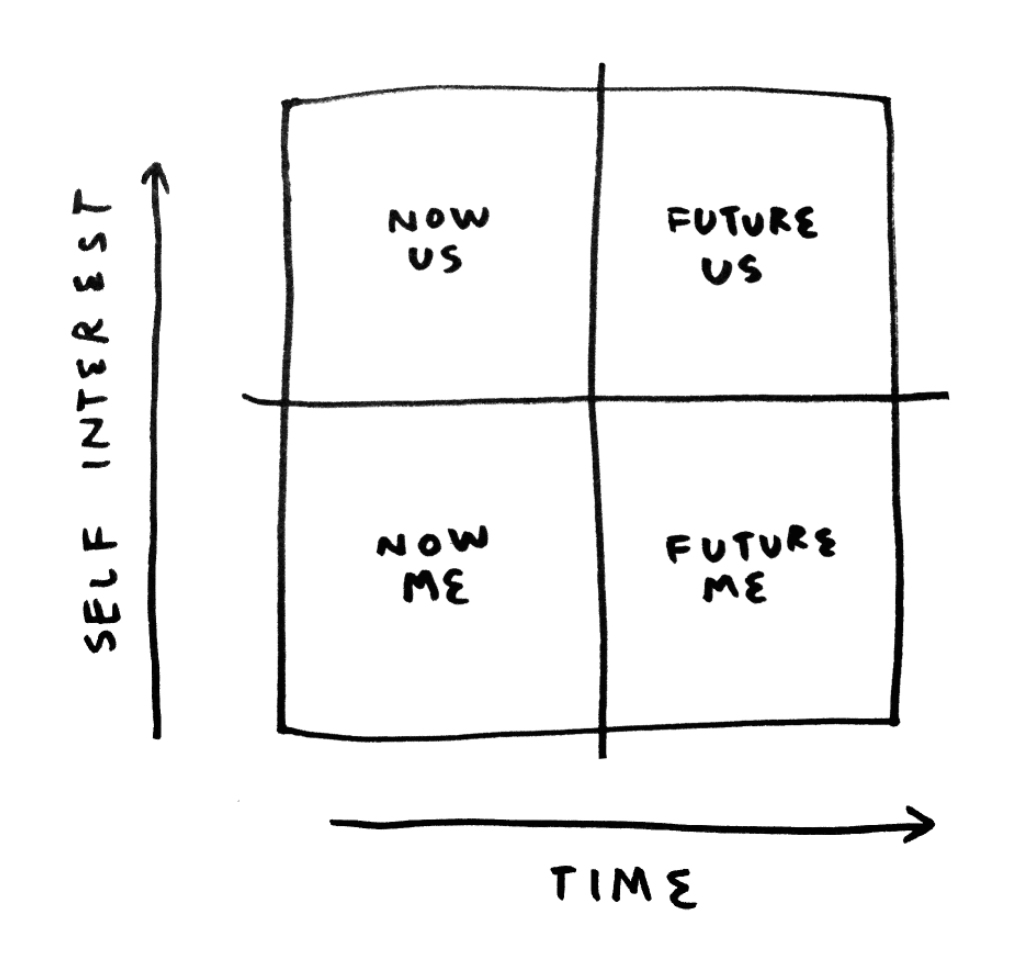Seeing Like a Networked Human Organism
This is part of the Write of Passage fellowship and was original posted on David Perell's website here.
Marc Andreesen coined the term “software is eating the world” in a 2011 opinion piece for the Wall Street Journal. It’s now 2020, nearly ten years later. Software has eaten the world. Almost four billion people (80% of adults) have a smartphone. With our newfound ability to send information and value anywhere at zero marginal cost, we should begin to view ourselves as a Networked Human Organism. That organism (that thing, that collective intelligence) is waking up. Marc’s thesis needs an update. What should we do now?
As a first step, we need a massive change to our collective mindset. We need to see the world from the network’s perspective: a new pair of glasses with a modified UI. This UI should take into account both individuals and the collective; both current generations and future generations. And yet, this UI should be simple. Here’s a powerful first take:

Each of the four squares represent different values that we can optimize for. We’re most familiar with the Now Me square—it tells you to solve immediate individual needs like hunger. But we can “zoom out” to other squares: In Future Me, you think about your personal values and search for meaning. In Future Us, we value future generations—our children and grandchildren (see climate change). And in Now Us, we value the people currently around us—our local and global communities.
Yancey Strickler first introduced this UI in this (great) book last fall. Although it could be called a variety of things (ZoomOutBox?), we currently call it a “Bento Box” and the philosophy, “Bentoism.” This term is inspired by the real-life bento box, a Japanese meal that has variety and balance. So too, with Bentoism. It balances our immediate personal desires (Now Me) with the long-term needs of our species (Future Us).
Although there are a lot of great frameworks to navigate the future, the Bento Box is especially powerful because it is both simple and widely applicable. Indeed, as we move away from our waning late Industrial Age paradigms, I expect “zooming out” (from Bentoism and related frameworks) to spread widely and become second nature (just like our base-10 system is now second nature).
Remember, Bentoism is not a new mindfulness app. It’s not a new tech antitrust law. It’s not a new type of carbon tax. It is a mindset to predict, build, and understand the emerging post-capitalist structures for our Networked Human Organism.
In the rest of this short essay, I’ll show the value of the Bento Box by applying it to a core question for humanity: What should we do with surplus? Then we’ll briefly conclude with a preview of the next essay and how you can get involved with Bentoism.
WHAT SHOULD WE DO WITH SURPLUS?
First, let’s use the Bento Box to answer “what should we do with surplus?” Remember that our current answers here—profit, taxes, etc.—have not been universally true throughout human history.
For example, in 4th century Athens, Greeks used a procedure called “antidosis” where wealthy individuals were taxed unless they chose another wealthier individual to be taxed first. Or in the Ju/'hoansi hunter-gatherer society, where the owner of the arrowhead (not the hunter) chooses where to distribute meat from a large kill.
If we're aiming for a smooth transition into post-capitalism, we should try to answer these types of questions from a blank slate and first-principles perspective.
We can answer this question for either individual surplus or collective surplus. Let’s look at individual first.
INDIVIDUAL SURPLUS
What do I mean by individual surplus? First, we can look at what it’s not. If you’re one of the 750M people still living on less than $2 per day, Now Me is the only square available. Because you’re concentrated on Now Me basic needs, it’s much more difficult to “zoom out” to Now Us (connection), Future Me (meaning), or Future Us (sustainability and self-actualization).
When we think about relative satisfaction per square, we can expand the box into a cube and think of each square “filling up” with liquid as we become more satisfied with those needs.

Once Now Me is filled up, we don’t need to keep putting time, money, or energy into it. For example, Bill Gates’ Now Me bucket is full. Although he has (at least) 1M times more money than I do, his Now Me bucket isn’t 1M times as full. Eating 1M times more food won’t make him 1M times happier. Instead, he can allow his energy to “overflow” into the other buckets. Let’s call this surplus “Now Me Overflow”.
As a simple example of Now Me Overflow, we can start saving for retirement (Future Me) or kids (Future Us) once our Now Me is full. As they say, “put your own oxygen mask on first.”
Charity is another example of “Now Me Overflow”. Our Now Me is full, so we give back to our community (Now Us) or the environment (Future Us). We are at a point in human history where more and more of us have Now Me Overflow and can give. After $45,000-$80,000/year, money only has a negligible effect on increasing your happiness (for individuals without kids). After that point, it makes rational sense to give a percentage of your income to charity. This has been formalized with pledges like the Giving What We Can Pledge, where almost 5,000 people have pledged 10% of their lifetime income to charity (and have given over $125M thus far). I’ve also taken this pledge—it’s been great! Although I haven’t had as much Now Me hedonic pleasure, I have experienced more eudonic pleasure of meaning, connection, and self-actualization.
So, to answer our original question above: what should individuals do with surplus? The Bentoist answer: Recognize your Now Me Overflow, and give to Future Me, Now Us, and Future Us.
COLLECTIVE SURPLUS
How does Bentoism think about collective surplus? For companies, collective surplus is usually called “profit”. In the traditional Now Me “shareholder” model, companies try to maximize revenue, minimize costs, and distribute the surplus to shareholders. But in a “stakeholder” model, companies decide to include Now Us and Future Us stakeholders in the surplus (by increasing employee wages, for example).
As another example, Patagonia is a public-benefit organization with a legal charter that allows it to not simply maximize shareholder profit. Instead, the charter mandates that Patagonia donates 1% of its net revenue to environmental conservation. In other words, Patagonia distributes its collective surplus to Future Us.
This begs the question: Why should Patagonia decide where the surplus goes for Future Us? Shouldn’t “Us” (the community) decide, not “Me” (Patagonia)? This is how taxes work: we put money into a tax pool that is then allocated by “Us”—governmental representatives. I don’t directly choose where my tax money goes.
Let’s look at an example where the community decides how to allocate a communal surplus pool (sometimes called participatory budgeting). The Embassy is a communal house in San Francisco. They rent out rooms with AirBnB, and then use a platform called Cobudget to vote on where to allocate their income. Instead of giving members a small decrease on their rent check or having the owner collect all the profits, they allocate funds to things like game nights with formerly incarcerated folks (!). In addition to experimenting with cobudgeting the surplus pool, The Embassy is exploring how to create the surplus pool in the first place. They have created a pool with Patreon to allocate to Now Us community projects.
Finally, individuals can also create these “Cobudgeting Pools.” For example, I put ETH into an address and publicly posted the key, letting anyone else decide where to spend the funds. (After 7 minutes, someone took the funds and donated them to the Against Malaria Foundation.)

As another example, I cancelled an AirBnB booking, and then the host and I communally decided who should keep the refund fees.
So, to answer our original question above: what should collectives do with surplus? The Bentoist answer: cobudget the surplus with Now Us and Future Us stakeholders, not just shareholders.
CONCLUSION
The protoexamples described above give a rough overview on how Bentoists think about surplus. But this is just one question. In the longer version of this Write of Passage essay (coming in March!), we’ll explore other questions like:
- How do other “zoom out-based” perspectives (and movements) relate to Bentoism?
- How does Bentoist individual responsibility (outlined above) get formalized into our institutions, laws, code, and markets?
- What should ambitious frontier people work on?
As our Networked Human Organism continues to build momentum towards Bentoist (Bentoish) ideas, I want to remind us that we aren’t trying to spread Bentoism specifically. Instead, we’re looking to co-create a world where we care about future generations and those around us. For the last 50 years, we’ve been stuck in an individualistic, Now Me paradigm. It’s this generation’s opportunity (and responsibility!) to build us out of it.
If you’d like to get involved, check out the Bentoism site, join our forum or newsletter, and reach out through that page. Thanks!
ABOUT THE WRITE OF PASSAGE FELLOWSHIP
This article was written by Rhys Lindmark as part of the Write of Passage Fellowship. It’s a short version of a 10,000-word essay I’ll be writing on this topic in the next few months.
We’d love to hear from you. If you have feedback, you can find the author on Twitter or email fellowship directors David Perell (david@perell.com) or Suthen Siva (suthens@gmail.com). I look forward to hearing from you.
Here is the list of essays we’re writing as a group: